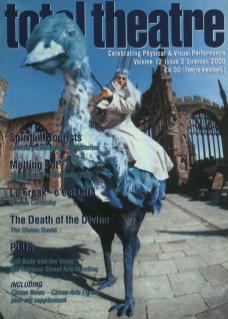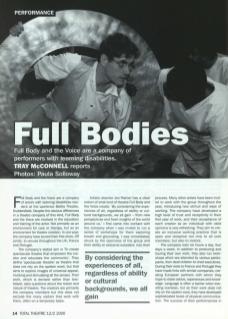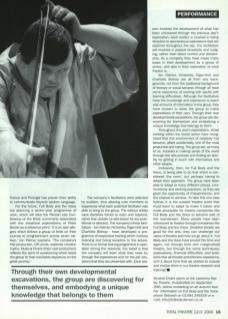Full Body and the Voice are a company of actors with learning disabilities resident at the Lawrence Batley Theatre, Huddersfield. Despite the obvious differences in a theatre company of this kind, Full Body and the Voice are involved in the education and training of the actor. Not primarily as an environment for care or therapy, but as an environment for theatre creation. In one year, the company have toured their first show, Off Limits, to venues throughout the UK, France and Portugal.
The company's stated aim is ‘to create spectacular theatre that empowers the creator and educates the community'. They define 'spectacular theatre' as theatre that does not rely on the spoken word, but that aims to explore images of universal appeal, involving and stimulating all the senses. Their work, which is devised rather than text-based, asks questions about the notion and nature of theatre. The creators are primarily the company members but this does not exclude the many visitors that work with them, often on a temporary basis.
Artistic director Jon Palmer has a clear notion of what kind of theatre Full Body and the Voice create: 'By considering the experiences of all, regardless of ability or cultural backgrounds, we all gain from new perspectives and fresh insights of the world around us.' I first came into contact with the company when I was invited to run a series of workshops for them exploring breath and grounding. I was immediately struck by the openness of the group and their ability to welcome outsiders into their process. Many other artists have been invited to work with the group throughout the year, introducing new stimuli and ways of working. The company have developed a high level of trust and receptivity in their first year of work, and their acceptance of each creator as an individual with valid opinions is very refreshing. They aim to create an inclusive working practice that is open and receptive not only to all core members, but also to visitors.
The company train six hours a day, four days a week. In addition to producing and touring their own work, they also run workshops which are attended by various participants, from deaf children to chief executives. During their visits to France and Portugal they have made links with similar companies, creating European partners with whom they hope to share advice, experiences and knowledge. Language is often a barrier when travelling overseas, but as their work does not rely on the spoken word, they have developed sophisticated levels of physical communication. The success of their performances in France and Portugal has proven their ability to communicate beyond spoken language.
For the future, Full Body and the Voice are planning a seven-year programme of work, which will take the Persian tale Conference of the Birds (commonly associated with the theatrical explorations of Peter Brook) as a reference point. ‘It is an epic allegory which follows a group of birds on their journey to enlightenment across seven valleys,' Jon Palmer explains. ‘The company's first production, Off Limits, explored creation myths, Musical Chairs [their next production] reflects the spirit of questioning which leads the group to their inevitable departure on the great journey.'
The company's facilitators were selected by audition, thus allowing core members to experience what each potential facilitator was able to bring to the group. The various artists were therefore forced to react and respond, rather than dictate (a valid lesson for any practitioner or director). The company's three facilitators – Jon Palmer, Kimberley Tilger-Holt and Charlotte Bishop – have developed a programme of responsive training which involves listening and being receptive to the actors. There is no formal training programme in operation during the sessions; the belief is that the company will learn what they need to through the experiences and ‘on the job' situations that they are presented with. Each session involves the development of what has been uncovered through the previous day's exploration; each creator is involved in being receptive to spontaneous explorations that are explored throughout the day. The facilitators are involved in passive receptivity and nudging, rather than direct control and dictatorship. As a company they have made many leaps in their development as a group of actors, and also in their exploration of what theatre is.
Jon Palmer, Kimberley Tilger-Holt and Charlotte Bishop are all from arts backgrounds, not from the traditional background of therapy or social services (though all have some experience of working with adults with learning difficulties). Although the facilitators have the knowledge and experience to teach vast amounts of information to the group, they have chosen to allow the group to make explorations of their own. Through their own developmental excavations, the group are discovering for themselves and embodying a unique knowledge that belongs to them.
Throughout the year's explorations, those working within the social sector have recognised that this environment of creativity has become, albeit accidentally, one of the most productive and caring. The group are, as many of us, involved in making sense of the world through the arts process and finding an identity by getting in touch with themselves and other people. Inclusivity, then, for Full Body and the Voice, is being able to do that which is considered ‘the norm', but perhaps having to adapt their approach. The group have been able to adapt to many different places, environments and working practices, as they are given the opportunity of independence, and the chance to achieve. To take this one step further, it is the outside theatre world that must learn to adapt to make it easier and more accessible for theatre companies like Full Body and the Voice to become part of the mainstream. Many people have been introduced to theatre through companies like Full Body and the Voice. Disabled people are good for the arts; they can challenge our views of theatre and how we go about it. Full Body and the Voice have proved this time and again, not through their own marginalised theatre, but through the same techniques, explorations, financial difficulties, and problems that all theatre practitioners experience. Isn't it about time that we started to include and involve them in our theatre research and training?
Musical Chairs opens at the Lawrence Batley Theatre, Huddersfield on September 29th, before embarking on an autumn tour.


